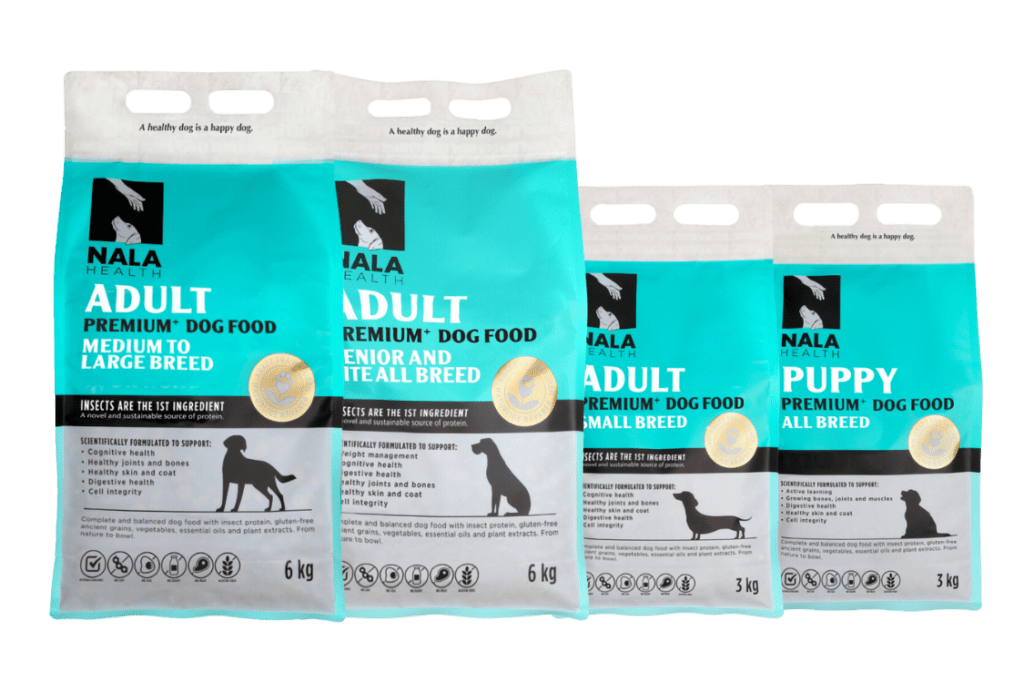Is Life-Stage Nutrition Important?
 Cecilie Hemsen Berg
Cecilie Hemsen Berg
Each stage in a dog’s life – puppyhood, adulthood, and senior years – has unique nutritional requirements. Puppies require nutrients that support growth and development, adult dogs need a balanced diet for maintenance, and senior dogs often need lower-calorie diets due to decreased activity. Therefore, feeding your dog according to its age/life stage is essential for maintaining its overall health and well-being, and can significantly improve both the lifespan and quality of life of your pet. Learn more about your dog’s unique nutritional needs for their age and common mistakes owners make. Jump to relevant sections:
- Your dog’s life stages
- Common Dog Feeding Mistakes Across Different Life Stages
- Puppies: Focus on Growth and Development
- Adults: Maintenance and Balance
- Seniors: Support ageing
Every dog is unique, and individual needs can vary within these stages based on breed, size, activity level, and health conditions. Consulting a veterinarian is helpful to tailor your dog’s diet, exercise regime and medication to their individual needs, especially if your dog has specific health conditions.

Your Dog’s Life Stages
Puppyhood
This stage begins at birth and lasts until your dog is about 12 – 24 months old, depending on the breed (size when fully grown). In this period, your puppy experiences rapid physical and cognitive development. You’ll observe them growing quickly in size, exploring their environment with boundless energy and curiosity. This is a critical time for socialisation and training, where puppies learn to interact with other dogs and humans, understand basic commands, and develop their personalities. Physically, their daily diet must secure all nutrients needed to build strong bones and teeth, develop healthy muscle mass, vision, etc.
Adulthood
Transitioning into adulthood typically occurs between 1 to 2 years of age. This is when your dog will reach their full size and their personality becomes more established. Regular exercise, a balanced diet, and mental stimulation are crucial for their physical and mental health and well-being. Dogs left to themselves for many hours per day will feel lonely and bored leading to depression, anxiety and destructive behaviour. During this stage, preventive health care is crucial, including regular check-ups, dental care, grooming and maintaining a healthy weight to prevent common lifestyle diseases.
Seniorhood

Dogs enter their senior years at different ages, generally starting around 6-10 years. This life stage is marked by a gradual slowdown in activity and may include the onset of age-related health issues such as arthritis, vision or hearing loss, and cognitive decline. Senior dogs require more care and attention, with adjustments in their diet, exercise routines, and more frequent veterinary visits to manage any health concerns. Despite their slower pace, senior dogs still enjoy and benefit from gentle activities, love, and companionship, offering a different but equally rewarding relationship with their owners.
Common Life Stage Feeding Mistakes
When choosing nutrition for our dog through various life stages, there are some common mistakes that can impact our pet’s health and well-being. Understanding and avoiding these errors can help ensure that our furry friends receive the proper nutrition at each stage of their life.
A great starting point is to review the table of contents listed on the dog food packaging. Take the time to acquaint yourself with the different ingredients and their nutritional values. If you have any queries, don’t hesitate to reach out to the manufacturer. This approach offers crucial insights and assists in making well-informed decisions for your canine companion. Here are some of the most common mistakes:
- Skipping Specialised Formulas: As dogs grow, their caloric needs change. Puppies need more calories for growth, while older dogs often require fewer calories. Failing to adjust their food and portion size to match their life stage can lead to underfeeding, overfeeding and nutritional deficiencies.
- Feeding “Human Food”: While it’s tempting to share meals with pets, human food often lacks the nutrients dogs need and can even contain harmful ingredients. Feeding our dogs meals that are balanced for humans, can lead to obesity and nutritional deficiencies.
- Not Consulting a Veterinarian: Dietary needs can vary greatly depending on the dog’s health, breed, and lifestyle. Not seeking professional advice, especially when transitioning between life stages or when health issues arise, can lead to improper nutrition.
- Using Supplements Unnecessarily: Giving our dogs vitamins or supplements without a vet’s recommendation can be harmful. Complete and balanced pet foods are made to ensure just the right amount of nutrients and adding more can actually be toxic – especially the fat-soluble vitamins (A,D,E,K).

- Ignoring Weight and Activity Levels: The nutritional needs of a highly active dog are different from those of a sedentary one. Failing to consider the dog’s lifestyle can lead to underfeeding or overfeeding.
- Sticking to One Food Type: While both dry and wet foods have unique benefits, combining them can be advantageous. Ensure your dog’s diet is primarily balanced dog food, but feel free to include steamed veggies, yoghurt, meat, or fruit for diversity. Also, change up your dog’s protein source throughout their life to give variety and avoid the development of sensitivities.
- Not Reading Labels Carefully: Dog food labels contain vital information about the ingredients and nutritional content. Not reading these labels can lead to choosing foods that are not appropriate for the dog’s life stage or specific health requirements.
- Neglecting Bowl Cleanliness: If we overlook the importance of regularly cleaning our dog’s food and water bowl, residue from food and saliva can create a breeding ground for bacteria and mould. This can lead to gastrointestinal and other health issues. It’s crucial to wash the food bowl daily.

Nutritional Needs per Generation
1. Puppies: Focus on Growth and Development
Puppyhood is the life stage where your dog will have the highest need for calories to support their rapid growth and high energy. This life stage starts from birth and lasts til your dog is between 9-24 months depending on the breed and size. Some specific considerations you should make during this age are:
- Puppy-specific diet: Ensure your puppy’s diet is specifically formulated for puppies. The protein content should be higher as growing pups need more protein than adult dogs. However, too much protein can be detrimental to healthy growth and result in an imbalance of calcium and phosphorus, which can negatively affect bone and joint development.
- DHA for Brain Development: Docosahexaenoic acid (DHA) is an omega-3 fatty acid important for brain and vision development. It’s typically found in mother’s milk, fish and marine algae*.
- Calcium and Phosphorus: Adequate levels of calcium and phosphorus are essential for proper bone growth and development. These should be in the correct ratio to prevent growth abnormalities, especially in large-breed puppies.
- Easily Digestible: Puppies have sensitive digestive systems. Foods that are easy to digest, with high-quality ingredients and fewer fillers, can help prevent gastrointestinal issues.
- Caloric Density: Higher calorie foods to support rapid growth and high energy levels.
*The level of Omega 3 in mothers’ milk and fish depends on their diet.


Any nutritional mistakes made during puppyhood can have severe, even irreversible and lifelong, consequences. Their diets generally contain more protein and fat than adult and senior diets. Because of their rapid growth, A general advice is to let your furry baby be on puppy food a little too long than not long enough.
Daily feeding schedule and feeding tips:
Feed your puppy small, frequent meals. Puppies have small stomachs but high energy needs. Feeding them small, frequent meals helps sustain energy levels and supports constant growth.
- 2 to 3 months old: 4 meals a day
- 3 to 6 months: 3 meals a day
- 6 months and onwards: 2 meals a day
Small to medium breeds usually transition to adult food at around 10-12 months, whereas medium to larger breeds may continue puppy food until between 12-14 months. Giant breeds usually transition to adult food at between 18 – 24 months.
Keep your puppy at a healthy weight, as being overweight can cause obesity at a later stage. Obesity is a lifestyle disease that unfortunately can lead to diabetes, joint issues and heart disease to mention a few. We recommend using a scale to weigh the meal portions as opposed to a scoop. This is because different dog food brands have different densities, which makes scoop measurement unreliable.


Nala Health Puppy Food
Understanding the unique needs of puppies, Nala Health focuses on supporting key areas of their growth. Bone, teeth and joint development are facilitated by the correct balance of calcium, phosphorus, and vitamin D. For cognitive health, good fats and DHA omega 3 from marine algae aid in brain and nervous system development. This, combined with puppy training, enhances their focus and learning abilities.
The immune system gets a boost from antioxidants found in sweet potatoes, carrots, baobab, and alfalfa. To support digestive health, probiotics and complex carbohydrates from various grains and vegetables are included. Additionally, ingredients like black soldier fly larvae and oils from canola and coconut help maintain healthy skin and fur.





2. Adults: Maintenance and Balance
During this period (from about 1 to 7 years), the focus shifts from growth to maintaining a healthy weight and overall condition. Your adult dog requires a balanced diet that supports their daily energy needs and maintains muscle mass. Portion control and regular exercise are key to preventing obesity, which can lead to other health problems. Some specific considerations you should make during this age are:
- Balanced Diet: Adequate protein, complex carbohydrates, and fats mainly for maintenance of regular bodily functions and activity.
- Fibre for Digestive Health: Adequate fibre helps in maintaining good digestive health, ensuring regular bowel movements and aiding in nutrient absorption.
- Essential Fatty Acids: Omega-3 and Omega-6 fatty acids are important for skin and coat health, brain function, and overall well-being.
- Vitamins and Minerals: To support overall health and immune system.
- Moderate Caloric Intake: Practice portion control to support their daily activity level and maintain a healthy weight. Treats and tidbits offered throughout the day should also be counted towards their daily calorie intake.


Daily feeding schedule and tips:
- 2 meals a day: Adult dogs typically require two meals a day to feel satiated throughout the day.
- Consistent Feeding Routine: Establish and maintain a consistent feeding schedule. This helps in managing their digestion and weight effectively.
- Vet checkups: Regular vet checkups are crucial to adjust diets as needed, especially to prevent the dog from developing health issues like obesity, diabetes or heart disease.
- Avoid Excessive Leftovers: Be cautious about feeding dogs human food. Many common foods can be toxic to dogs (raisins and chocolate), and a diet high in table scraps can lead to nutritional imbalances.
- Adjust portions based on exercise: If your dog is very active during a period increase their portion size to provide extra energy. You can also add some fish, meat, organ meat, butternut, or sweet potatoes for added calories – just be aware that excessive protein can cause health issues. Likewise, if your dog has had a sedate day, you can reduce their portion size slightly.


Nala Health for Adult Dogs
Nala Health adult dog food is specifically formulated to support cognitive health, with marine algae providing DHA omega 3 essential for concentration and memory. Calcium, phosphorus, vitamin D, and omega-3 continue to support healthy bones and joints. Digestive health is maintained through a combination of fibre, butyrate, and probiotics.
The addition of cold-pressed oils ensures a shiny coat and healthy skin. The immune system is bolstered by antioxidants from unique sources like rooibos, herbs and sea lettuce. We offer two tailored options: a nutrient-dense food for small adult dogs and a balanced calorie food for medium to large breeds, addressing the specific needs of different-sized dogs.





3. Seniors: Support ageing
Senior dogs (7 years +) often require lower-calorie diets to prevent weight gain due to a slower metabolism and decreased activity levels. Other concerns revolve around their dental health, cognitive function, joints and digestive issues. The decision on whether to change to senior dog food should be based on many factors based on your dog’s lifestyle, health status, and disease risk. Senior dog’s nutritional needs include:
- Lower Calorie food: Less active seniors with a slowing metabolism need fewer calories to avoid weight gain. Adjust their diet to a lower-calorie formulation while still providing essential nutrients.
- High-Quality Protein: This is important throughout life but during the senior years, maintaining an adequate protein intake to support muscle mass is important. Ensure it is easily digestible to ease the strain on older organs, particularly the kidneys.
- Increased Fibre: A diet higher in fibre can be beneficial for senior dogs to maintain good digestive health and regular bowel movements, especially if they struggle with constipation.
- Easily Digestible Ingredients: As older dogs may have a less efficient digestive system ensure their food is easily digestible.


- Added amino acids: Look for food containing taurine as it supports the heart and L-carnitine for energy production. L-carnitine also benefits in slowing brain decline and combating heart disease.
- Omega 3: Studies indicate that Omega 3 fatty acids enhance brain function and eyesight, support heart and kidney health, alleviate dry skin, and strengthen the immune system in senior dogs.
- Glucosamine and Chondroitin: Research indicates that glucosamine helps regulate the synthesis of collagen in cartilage and may provide mild anti-inflammatory effects while chondroitin protects the joints from destructive enzymes.
Daily feeding schedule and tips:
- Adapted Kibble Size and Texture: As senior dogs may have dental issues or decreased jaw strength, consider softer or smaller-sized kibble to make eating easier and more comfortable. You can add water to the kibbe to moisten it.
- Hydration: Encourage regular hydration, as older dogs may be less efficient at regulating their body temperature and can be prone to dehydration.
- Added fibre: Adding steamed, unseasoned vegetables like butternut, pumpkin, carrots or sweet potato provides antioxidants, fibre and variety.
- Visit the vet: Regular veterinary visits to monitor health issues like kidney function, arthritis, or dental problems.
Under normal circumstances, dogs can meet their nutritional needs with a diet that incorporates both plant and animal-based components. The source of proteins and fats in their diet is less important than the quality and digestibility of these nutrients. A diet exclusively comprising one food group (eg. meat only) would lack balance, failing to supply all the vital nutrients necessary for a dog’s overall well-being.


The most valuable tip for feeding your dog is to provide him or her with the highest-quality food within your budget. The distinction between premium and budget dog food is usually not visible on the nutrition label but lies in the quality and origin of the ingredients used.
Nala Health for Senior Dogs
Nala Health Senior Lite addresses the needs of older dogs or those requiring a diet lower in calories, fat, and protein. It continues to support cognitive health with DHA omega 3 from marine algae. Essential nutrients like calcium, phosphorus, vitamin D, and omega-3 are included for the maintenance of joints and bones.
Digestive wellness is supported by fibre, butyrate and probiotics. Cold-pressed rapeseed oil and coconut oil maintain skin and coat condition. The immune system benefits from antioxidants found in rooibos, baobab fruit, and botanical extracts. Weight management is a key focus, with Taurine and L-Carnitine aiding in fat digestion and utilisation, also contributing to heart- and brain health.





Conclusion
Nutrition is a comprehensive field, and there are many different recommendations and approaches. Every dog is unique, in terms of genetic disposition, size, appetite, and so forth. We must understand what our own dog needs. Here, both breeders and veterinarians are important partners. Another aspect is choosing a quality food that fits our budget. Check different food varieties, and remember that a complete and healthy dog food depends on the quality and composition of the ingredients.
Genes certainly play a central role, but a good lifestyle tailored to the dog’s age, including diet, exercise, rest, mental training, proper care, and plenty of love, will for most dogs lay a valuable foundation so that each phase of the dog’s life is characterised by vitality, health, and joy.
Nala Health’s commitment to using sustainable and high-quality ingredients ensures that dogs at every life stage receive the nutrition they need for a healthy and fulfilling life.

